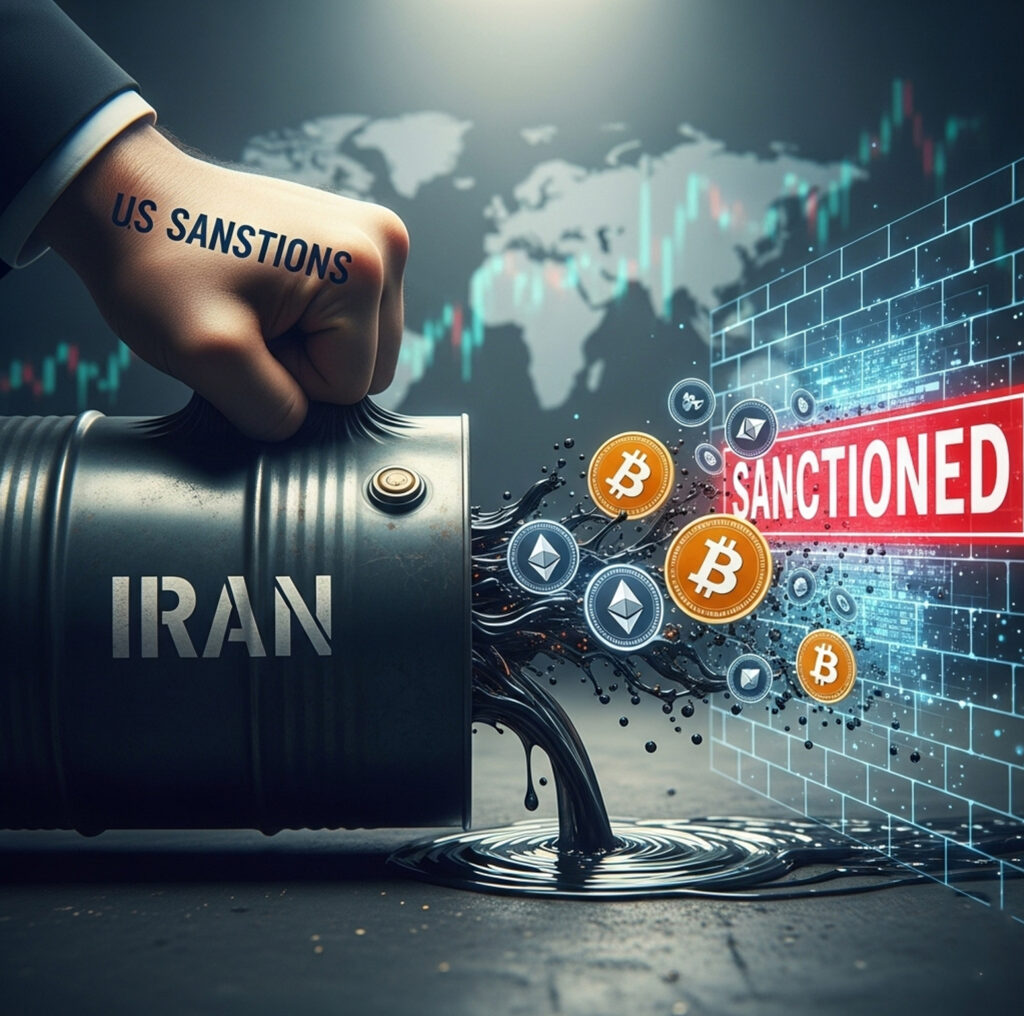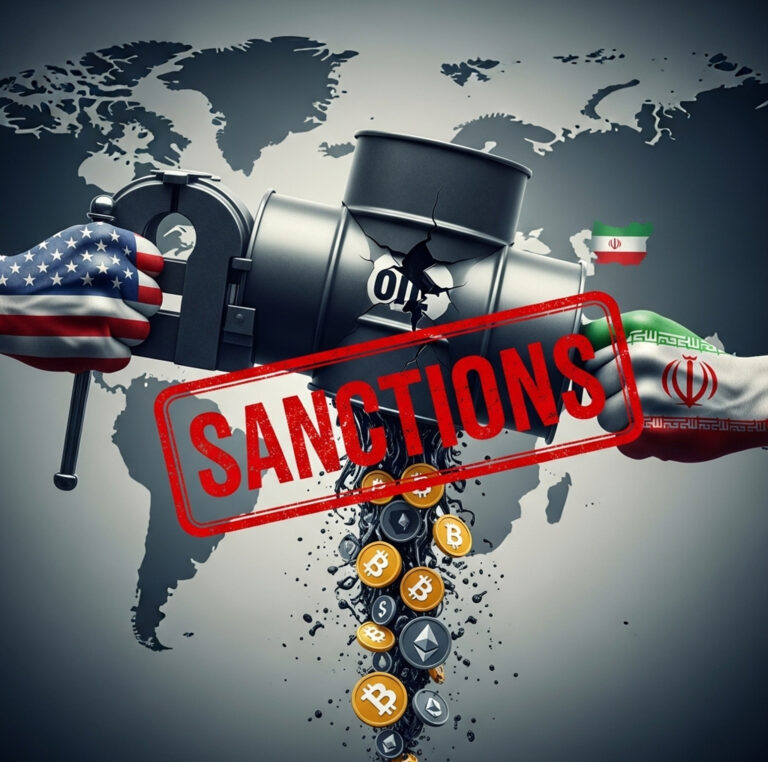Premium Biz Post – The United States has announced a fresh wave of sanctions targeting individuals and companies involved in cryptocurrency dealings tied to Iranian oil sales. According to officials, the scheme allegedly processed more than $100 million through shell firms and shadow financial networks in Hong Kong and the United Arab Emirates. This marks another step in Washington’s effort to choke off Iran’s revenue streams and limit the country’s ability to fund its military operations. The keyword US Imposes Sanctions on Iran Oil Crypto Transactions has become a highlight of global discussions as digital currencies play a greater role in international trade.

Background: Iran’s Oil and Crypto Connection
Iran’s oil industry has long been under heavy international scrutiny. With sanctions curbing its ability to sell oil openly, Tehran has looked for alternative routes to generate income. One such avenue is the use of digital assets, particularly cryptocurrencies, which can bypass traditional banking systems and offer a level of anonymity.
By converting oil revenues into cryptocurrencies, Iranian networks can transfer funds without immediate detection. The process typically involves using shell companies, intermediaries in offshore jurisdictions, and digital wallets spread across multiple platforms. This not only complicates tracing but also provides Tehran with a steady flow of income despite sanctions.
Details of the Sanctions
The U.S. Treasury Department revealed that two Iranian financiers played a central role in organizing the crypto-based oil trade. Working alongside companies registered in Hong Kong and the UAE, they allegedly facilitated over $100 million in transactions.
According to official statements, these entities created a complex web of financial activity designed to obscure the origin of funds. Once oil shipments were sold, the revenue was quickly converted into digital currencies such as Bitcoin and Tether. From there, funds were moved through decentralized exchanges and wallets to eventually benefit Iranian government agencies, including military units.
Sanctions now prohibit U.S. individuals and companies from engaging with the listed entities. Any assets linked to them in American jurisdiction are also frozen.
Washington’s Strategic Objective
The move underscores Washington’s determination to crack down on illicit finance networks that exploit cryptocurrencies. By sanctioning individuals and firms across Asia, the U.S. is signaling that it will not tolerate the use of digital assets to bypass restrictions on Iran’s oil sector.
U.S. officials argue that Iran’s ability to access international markets through crypto undermines the global financial system. They also highlight concerns that such revenues may fuel destabilizing activities across the Middle East, from funding proxy groups to advancing Iran’s missile program.
Global Reactions
The announcement drew varied responses worldwide.
- Hong Kong: Financial authorities emphasized that they are committed to ensuring compliance with international sanctions. Some local firms have already begun internal reviews to distance themselves from the listed entities.
- UAE: Officials noted their ongoing cooperation with U.S. regulators, promising to investigate firms allegedly involved in the scheme. The UAE has faced criticism in recent years for being a hub for financial flows linked to sanctioned states.
- European Union: EU policymakers echoed U.S. concerns, stressing that Iran’s circumvention of sanctions through crypto poses a serious challenge. However, they also urged dialogue to avoid escalating tensions in global energy markets.
Read More : ”DIY for Kids: 5 Easy and Fun Creative Activities”
Implications for the Cryptocurrency Market
Sanctions of this scale have direct consequences for the global crypto ecosystem. Several exchanges and wallet providers may now tighten their compliance measures to avoid being implicated. Blockchain analytics firms will likely increase monitoring of transactions tied to sanctioned regions.
This action also highlights the ongoing debate about whether cryptocurrencies are tools for financial freedom or vehicles for illicit finance. While blockchain technology promises transparency, sophisticated actors continue to exploit gaps in regulation.
Iran’s Likely Response
Experts predict that Iran will double down on alternative methods of financial transfer. Tehran has shown resilience in adapting to sanctions, often experimenting with barter deals, gold transactions, and now digital assets.
Some analysts believe Iran might increase its reliance on decentralized finance (DeFi) platforms, which are harder to regulate compared to centralized exchanges. Others argue that Tehran may expand cooperation with countries less aligned with U.S. policies, using state-backed digital currencies (CBDCs) to facilitate trade.
Broader Geopolitical Context
The sanctions come at a time when global energy markets are already volatile. Disruptions in oil supply, rising prices, and geopolitical tensions in the Middle East amplify the stakes of such measures. The U.S. wants to ensure that Iran cannot use hidden channels to profit from its vast oil reserves.
At the same time, this move reflects Washington’s growing focus on the intersection of energy, finance, and digital assets. As more countries explore blockchain-based trade, the risk of sanctions evasion could become a recurring challenge for global regulators.
Expert Opinions
Financial crime experts argue that this is only the beginning. As digital assets become mainstream, regulators must innovate faster.
- Compliance Specialists: They warn that exchanges without robust Know Your Customer (KYC) and Anti-Money Laundering (AML) systems risk becoming conduits for sanctioned activities.
- Blockchain Analysts: They note that while cryptocurrencies are traceable, complex layering strategies—such as mixing services—can hinder enforcement.
- Policy Advisors: Some recommend stronger international cooperation to align crypto regulations, while others caution that overly strict measures may stifle innovation.
The Future of Crypto and Sanctions
Looking forward, the key question is whether sanctions can effectively deter nations from using cryptocurrencies in the first place. Critics argue that sanctions push countries like Iran further into the digital realm, accelerating adoption of alternative payment systems. Proponents believe that targeted sanctions remain essential, as they disrupt networks and raise the cost of evasion.
The case also raises ethical concerns about the balance between financial privacy and national security. While ordinary users advocate for freedom in crypto transactions, governments stress the need to safeguard against terrorism financing and sanction evasion.
The U.S. decision to sanction Iranian crypto transactions tied to oil sales represents a turning point in the global debate on digital assets and sanctions enforcement. It sends a clear message that Washington will pursue not only traditional financial institutions but also crypto-based systems when targeting illicit networks.
With US Imposes Sanctions on Iran Oil Crypto Transactions making headlines, the world is watching how Iran adapts and how regulators refine their strategies. The evolving landscape suggests that digital assets will remain at the center of geopolitical and financial battles in the years to come.



